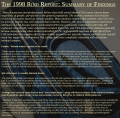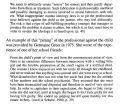Rind et al
Rind et al, or the Rind Report is the common name given to a study by Bruce Rind, Department of Psychology Temple University, Philip Tromovitch, Graduate School of Education Temple University and Robert Bauserman, Department of Psychology, University of Michigan entitled A Meta-Analytic Examination of Assumed Properties of Child Sexual Abuse Using College Samples published in The Psychological Bulletin of the American Psychological Association, April 1999.
Reaction to the Rind Report
This study generated a large amount of controversy, first by conservative talk show hosts such as "Dr." Laura Schlessinger, but later spread through political circles to the US Congress where it was "condemned and denounced" by a unanimous vote of 355-0 (with 13 voting "present") on July 12, 1999.[1]
However, pressed to justify itself, the APA submitted the meta-analysis to yet another round of scientific peer-review and study by statisticians who drew the following conclusion:
- "Ray Fowler, Ph. D., writes at May 25, representing the APA: "Because the article has attracted so much attention, we have carefully reviewed the process by which it was approved for publication and the soundness of the methodology and analysis. This study passed the journal's rigorous peer review process and has, since the controversy, been reviewed again by an expert in statistical analysis who affirmed that it meets current standards and that the methodology, which is widely used by the National Institutes of Health (NIH) to develop guidelines, is sound."
In addition, a number of press releases and rebuttals surfaced offering a variety of reasons why the study should be repudiated. The author, and others countered these rebuttals.
The study itself
It set about to investigate how previous research, taken as a collective, addresses these common assumptions:
- Child sexual abuse (CSA) causes psychological harm,
- this harm is pervasive,
- this harm is intense, and
- boys and girls experience CSA equivalently.
The authors undertook this through a meta-analysis, correlating the statistics from all known studies of CSA known to exist in the English language that use college samples.
Abstract
Many lay persons and professionals believe that child sexual abuse (CSA) causes intense harm, regardless of gender, pervasively in the general population. The authors examined this belief by reviewing 59 studies based on college samples. Meta-analyses revealed that students with CSA were, on average, slightly less well adjusted than controls. However, this poorer adjustment could not be attributed to CSA because family environment (FE) was consistently confounded with CSA, FE explained considerably more adjustment variance than CSA, and CSA-adjustment relations generally became non-significant when studies controlled for FE. Self-reported reactions to and effects from CSA indicated that negative effects were neither pervasive nor typically intense, and that men reacted much less negatively than women. The college data were completely consistent with data from national samples. Basic beliefs about CSA in the general population were not supported. [quoted directly from the paper]
Findings with respect to causality
The finding that family environment was confounded with CSA and explained nine times more adjustment variance than did CSA is consistent with the possibility that the CSA-adjustment relation may not reflect genuine effects of CSA [...] analysis of studies that used statistical control further supported the possibility that many or most CSA-symptom relations do not reflect true effects of CSA, because most CSA-adjustment relations became nonsignificant under statistical control. [quoted directly from the paper]
Gender gap (or absence of)
The overall difference between male and female college students in the CSA-adjustment relationship is not surprising, because men experienced coercion less frequently than women. [...] "Because all levels of consent corresponds to social and legal definitions of CSA, these results imply that, in the college population, the association between CSA and adjustment problems is not equivalent for men and women. If the definition of CSA is restricted to unwanted sex only, however, then these results imply a gender equivalence between men and women in the association between CSA and adjustment problems. [quoted directly from the paper]
Commentary
From Lilienfeld et al - 50 Great Myths of Popular Psychology.[2]
In 1998, Bruce Rind and his colleagues conducted a meta-analysis (see p. 32) of the research literature on the correlates of child sexual abuse in college students. They had earlier conducted a similar review using community samples, which yielded almost identical results (Rind & Tromovitch, 1997). Their 1998 article appeared in the American Psychological Association’s Psychological Bulletin, one of psychology’s premier journals. Chock full of dense numerical tables and the technical details of statistical analyses, Rind and colleagues’ article seemed an unlikely candidate for the centerpiece of a national political firestorm. Little did Rind and his colleagues know what was in store.
Rind and his co-authors reported that the association between a self-reported history of child sexual abuse and 18 forms of adult psychopathology—including depression, anxiety, and eating disorders —was weak in magnitude (Rind, Tromovitch, & Bauserman, 1998). The average correlation between the two variables was a mere .09, an association that’s close to zero. Moreover, a history of an adverse family environment, such as a highly conflict-ridden home, was a much stronger predictor of later psychopathology than was a history of sexual abuse. As Rind and his co-authors cautioned, the effects of early abuse are difficult to disentangle from those of a troubled family environment, particularly because each can contribute to the other. Surprisingly, they found that the relation between sexual abuse and later psychopathology was no stronger when the abuse was more severe or frequent.
The “Rind article,” as it came to be known, provoked a furious media and political controversy. Radio talk-show personality Dr. Laura Schlessinger (“Dr. Laura”) condemned the article as “junk science at its worst” and as a “not-so- veiled attempt to normalize pedophilia” (Lilienfeld, 2002). Several members of Congress, most notably Representatives Tom DeLay of Texas and Matt Salmon of Arizona, criticized the American Psychological Association for publishing an article that implied that sexual abuse isn’t as harmful as commonly believed. On the floor of Congress, Salmon referred to the article as the “emancipation proclamation of pedophiles.” Eventually, on July 12, 1999, the Rind article was denounced by the House of Representatives in a 355 to 0 vote, earning it the dubious distinction of becoming the first scientific article ever condemned by the U.S. Congress (Lilienfeld, 2002; McNally, 2003; Rind, Tromovitch, & Bauserman, 2000).
Carol Tavris, The uproar over sexual abuse research and its findings, in Society (2000)[3]
Perhaps the researchers' most inflammatory fording, however, was that not all experiences of childadult sexual contact have equally emotional consequences nor can they be lumped together as "abuse:' Being molested at the age of 5 is not comparable to choosing to have sex at 15. Indeed, the researchers found that two-thirds of males who, as children or teenagers, had had sexual experiences with adults did not react negatively.
Shouldn't this be good news? Shouldn't we be glad to know which experiences are in fact traumatic for children, and which are not upsetting to them?
Gallery
-
Rind Infographic
-
Summarized findings
-
Rind on the flawed Victimological model
-
Excerpt from a 2000 Oellerich paper reflecting on the controversy
-
More from Oellerich
-
Infomeme compiling data presented by Rind in a later series of papers
-
Rind later presented a secondary analysis on the Finnish survey data.
See also
- Rind resolution (official reactions to the Rind report)
External links
- Full text of the Rind Report
- Science and Morality or The Rind et al. Controversy - a counter-rebuttal to public reaction against the Rind Report.
- RBT Files - Ipce's full list of articles concerning the controversy.
- Everything you wanted to know about... - MHAMic and RBT files on Ipce.
- "Rind et al. (1998)" - BoyWiki Article.
- Wikipedia
References
- Official Encyclopedia
- Research
- Censorship
- Sociological Theory
- Hysteria
- TV & Media
- Research into effects on Children
- Research: Broader Perspectives
- History & Events
- History & Events: American
- History & Events: 1990s
- History & Events: Personal Scandals
- Publications & Documents
- Pubs: Research/Papers
- History & Events: Moral controversies





